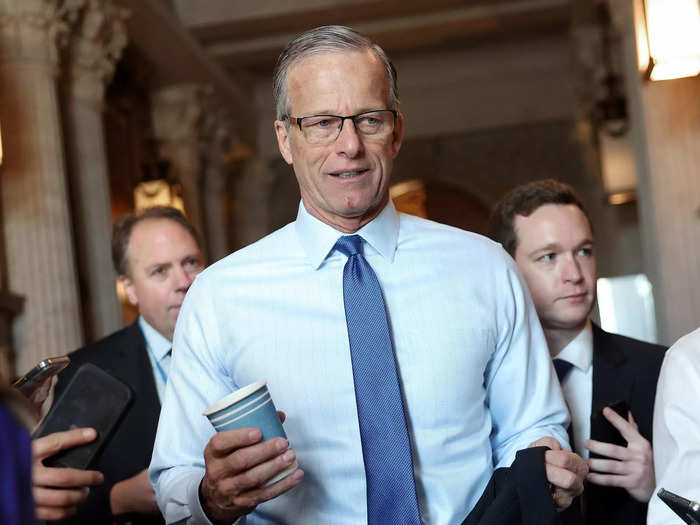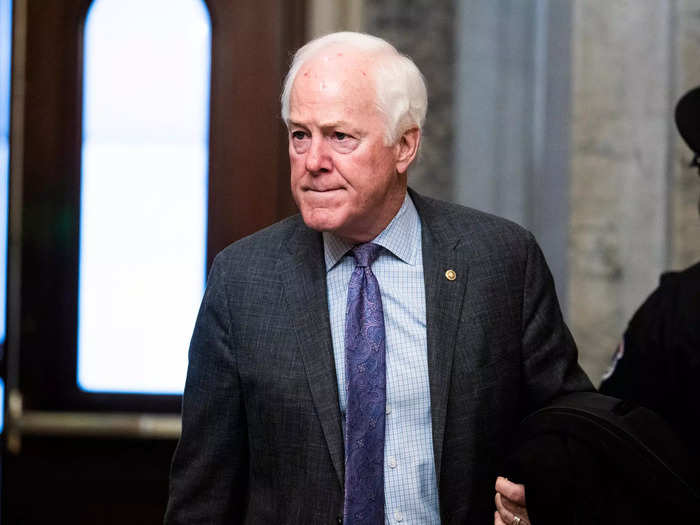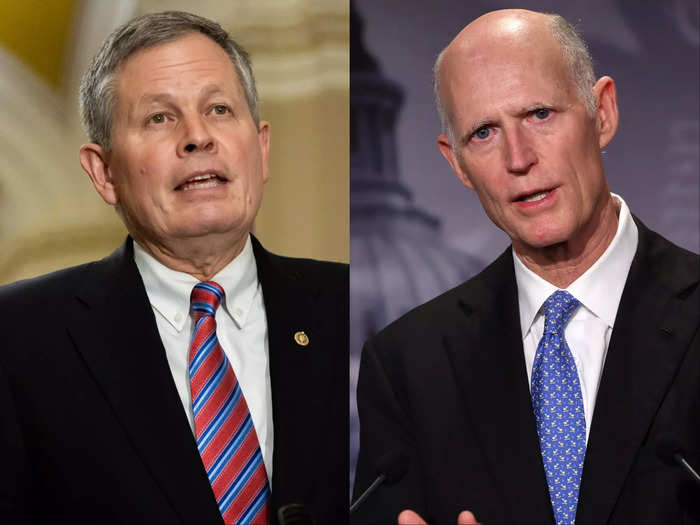Sens. John Thune of South Dakota and John Cornyn of Texas are the only declared candidates for Senate GOP leader so far.Alex Wong and Kevin Dietsch/Getty Images
- Mitch McConnell is stepping down from being Senate GOP leader after more than 17 years in the job.
- The race to succeed him is already on, even though senators won't decide until November.
Mitch McConnell's reign as Senate Republican leader is set to end next January, capping off what will ultimately be an 18-year tenure — the longest of any Senate leader in American history.
Two men, among the "three Johns" who have long been viewed as potential successors to the Kentucky Republican, have already jumped into the race: Sens. John Thune and John Cornyn. But other candidates could emerge in the coming months, and the election isn't slated to happen until November.
Don't expect this race to bring kind of the public chaos that House Republicans have seen in the last year. The contest will take place behind closed doors, votes will be kept secret, and there's no such thing as a "motion to vacate" in the collegial upper chamber.
The race will, however, likely expose internal GOP divisions over the future of the party, and what it stands for. McConnell's penchant for bipartisanship and support for Ukraine aid in particular have rankled a small segment of GOP senators, and that cohort could be influential in determining who GOP senators succeed in November.
Here's what to know about the current and potential candidates.
Sen. John Thune of South Dakota
Sen. John Thune of South Dakota. Kevin Dietsch/Getty Images
Thune, age 63, is currently the second-highest-ranking Republican senator.
As minority whip, Thune is officially in charge of taking the pulse of rank-and-file GOP senators and knowing how votes will break down ahead of time — a position that affords him relationships across the conference.
Altogether, Thune is the most McConnell-like of the current and potential leader candidates. He's worked closely with the Kentucky Republican and shares his views on both Ukraine aid and foreign policy more broadly.
As he's begun pitching himself to fellow GOP senators, he has said in interviews that he would represent a "new generation" of leadership — he's nearly two decades younger than McConnell — and will seek to empower individual members of the conference.
He could, however, have a problem with former President Donald Trump.
Thune endorsed Sen. Tim Scott of South Carolina when he ran for president last year, described Trump's conduct on January 6, 2021 as "inexcusable," and has been willing to criticize the former president over the last several years.
He was also relatively late in endorsing Trump, doing so in February long after it had become clear that he would be the party's presidential nominee.
While Trump won't be able to pick the next Senate GOP leader himself, Thune may be hoping that the former president doesn't get deeply involved in the race.
Sen. John Cornyn of Texas
Tom Williams/CQ-Roll Call via Getty Images
Cornyn, 72, isn't currently in Senate GOP leadership — but he's got a lot of experience in that department.
The Texas Republican served as chairman of Senate Republicans' campaign arm, the National Republican Senatorial Committee (NRSC), from 2009 to 2013, then as the conference's whip from 2013 to 2019.
His biggest talking point, so far, is that the Senate is "broken," and that he has the experience to try to fix it. He has pledged to "restore the important role of Senate committees" and said there will be "no more backroom deals" if he becomes leader — a reference to the top-down way in which party leaders, including McConnell, have often run Washington.
Cornyn's most controversial proposal in that department has been term limits for the Republican leader, which already exist for other leadership posts.
McConnell recently dismissed that idea, saying it would be "totally inappropriate" and that senators "ought to be able to be free to choose whoever."
Other possible candidates: Sens. Steve Daines of Montana or Rick Scott of Florida
Sens. Steve Daines and Rick Scott, the current and former chairs of the Senate GOP's campaign committee, have also been floated as potential contenders. Nathan Posner/Anadolu Agency via Getty Images; Kevin Dietsch/Getty Images
Neither Daines, 61, or Scott, 71, have officially declared that they're running. But neither of them have said that they're not running either.
Both men are somewhat constrained from doing so at the moment: Daines is currently the chairman of the NRSC, and Scott is campaigning for his own reelection in Florida.
But Trump is reportedly a fan of Daines, which could give him a boost if he enters the race after the election in November.
How Republicans perform in this year's Senate races could also be a key factor. If they win the majority, Daines' stock rises. If they fail, he's probably out.
Scott, the previous NRSC chair, famously launched the first-ever challenge to McConnell in late 2022. He handily failed, winning just 10 votes, but he cemented his place as a leading figure among those who dissent from the Kentucky Republican's views.



